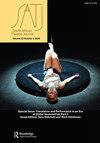Introduction
IF 0.2
0 THEATER
引用次数: 0
Abstract
This special issue focuses on a production, Antigone (not quite/quiet), created and staged at the Baxter Theatre, in Cape Town, in 2019. The production was one of a number of similar productions created as part of the project: Reimagining Tragedy from Africa and the Global South (ReTAGS), funded by the Andrew W. Mellon Foundation between 2019 and 2023. ReTAGS is a project that proposes to take a concept – tragedy – from the very beginnings of theatre in its European manifestation and therefore of the discipline of Theatre Studies which is decidedly European, and to reimagine it from a perspective in Africa that is at once directed at the complex challenges of our global postcolonial present and towards our possible futures both inside and outside of the theatre. It is clear that there have been numerous adaptations and stagings of ancient tragedies by major writers and theatre-makers across the African continent, particularly through the period of anti-colonial struggle and the rise of independent nation-states after the Second World War. To name just a few on the continent: Wole Soyinka, Ola Rotimi, Femi Osofisan, J.P. Clark (Nigeria), Efua Sutherland (Ghana); Ebrahim Hussein (Tanzania), Sylvain Bemba (Congo Brazzaville), Saad Ardash and numerous others (Egypt), Athol Fugard and others (South Africa); Trinidad Morgades (Equatorial Guinea). In the Afro-diaspora: Aimé Césaire (Martinique), Félix MorisseauLeroy (Haiti), Kamau Brathwaite (Barbados), Derek Walcott (St Lucia). There is something about these plays and their playing that appeals to African theatremakers, performers and audiences. ReTAGS has set out to interrogate this vast body of work produced in the theatres of Africa and its diaspora. Furthermore, and importantly for this special issue, it uses performance methodologies as analytical tools to gain purchase on the complex realities of the colonial aftermath by investigating current events in the postcolony beyond the theatre, through the ‘prism of tragedy’ (Quayson 2003, p. 56). The project is inspired by a reading of the recent work of David Scott (2004; 2014) and of Hans-Thies Lehmann (2016). For Scott, in rough summary, the history of anticolonialism and its aftermath has traditionally been framed through the trope of romance: the triumph of good after trials and tribulations. Such a framing is dependent on a utopian horizon towards which the narrative proceeds. This has led to a triumphalist narrative of salvation and redemption in which the evil colonial regime is overthrown by the steadfast persistence and bravery of the people and/or the anticolonial hero who emerge victorious at the end. Scott examines the revisions CLR介绍
本期特刊聚焦于2019年在开普敦巴克斯特剧院创作并上演的作品《Antigone》(不太/安静)。该作品是作为该项目的一部分创作的众多类似作品之一:《重塑非洲和全球南方的悲剧》(ReTAGS),由安德鲁·W·梅隆基金会在2019年至2023年间资助。ReTAGS是一个项目,它提出了一个概念——悲剧——从戏剧在欧洲的一开始就体现出来,因此也是戏剧研究学科的一部分,并从非洲的角度重新构想它,同时针对我们全球后殖民时代的复杂挑战,以及我们在剧院内外可能的未来。很明显,非洲大陆的主要作家和戏剧制作人对古代悲剧进行了大量改编和上演,特别是在第二次世界大战后的反殖民斗争和独立民族国家崛起时期。仅举非洲大陆的几个例子:Wole Soyinka、Ola Rotimi、Femi Osofisan、J.P.Clark(尼日利亚)、Efua Sutherland(加纳);易卜拉欣·侯赛因(坦桑尼亚)、西尔万·贝姆巴(刚果布拉柴维尔)、萨阿德·阿达什和其他许多人(埃及)、阿索尔·福加德和其他人(南非);特立尼达摩尔加德斯(赤道几内亚)。在非洲侨民中:艾梅·塞泽尔(马提尼克)、费利克斯·莫里塞乌勒罗伊(海地)、卡马乌·布拉斯韦特(巴巴多斯)、德里克·沃尔科特(圣卢西亚)。这些戏剧和它们的表演吸引了非洲的剧院制作人、表演者和观众。ReTAGS已着手审问这部在非洲及其散居国外的剧院制作的大量作品。此外,对于这期特刊来说,重要的是,它使用表演方法作为分析工具,通过“悲剧棱镜”调查戏剧之外的后殖民时代的时事,从而了解殖民后果的复杂现实(Quayson 2003,第56页)。该项目的灵感来源于对David Scott(2004;2014)和Hans Thies Lehmann(2016)最近作品的阅读。粗略地说,对斯科特来说,反殖民主义及其后果的历史传统上是通过浪漫的比喻来构建的:善良在经历磨难后的胜利。这样的框架依赖于一个乌托邦式的地平线,叙事朝着这个地平线前进。这导致了一种救赎和救赎的必胜主义叙事,在这种叙事中,邪恶的殖民政权被人民和/或最终获胜的反殖民英雄的坚定坚持和勇敢推翻。Scott检查CLR的修订
本文章由计算机程序翻译,如有差异,请以英文原文为准。
求助全文
约1分钟内获得全文
求助全文

 求助内容:
求助内容: 应助结果提醒方式:
应助结果提醒方式:


